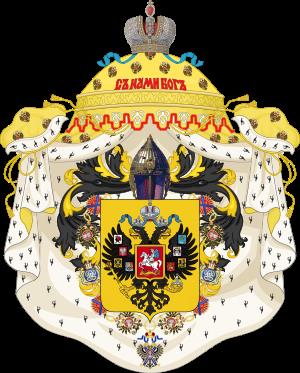This is a list of all reigning monarchs in the history of Russia. It includes titles Prince of Novgorod, Grand Prince of Kiev, Grand Prince of Vladimir, Grand Prince of Moscow, Tsar of All Rus', and Emperor of All Russia. The list started with a semi-legendary Prince of Novgorod Rurik sometime in the mid 9th century (862) and ended with the Emperor of All Russia Nicholas II.The vast territory known today as Russia covers an area that has been known historically by various names, including Rus', Kievan Rus', the Grand Duchy of Moscow, the Tsardom of Muscovy and the Russian Empire, and the sovereigns of these many nations and throughout their histories have used likewise as wide a range of titles in their positions as chief magistrates of a country. Some of the earliest titles include Kniaz and Velikiy Kniaz, which mean "Prince" and "Great Prince" respectively but are often rendered as "Duke" and "Grand Duke" in Western literature; then the title of Tsar, meaning "Caesar", which was disputed to be the equal of either a king or emperor; finally culminating in the title of Emperor. The full title of the Russian Emperors, according to Article 59 of the 1906 Russian Constitution, was given as:Emperor and Autocrat of all the Russias, of Moscow, Kiev, Vladimir, Novgorod, Tsar of Kazan, Tsar of Astrakhan, Tsar of Poland, Tsar of Siberia, Tsar of Chersonesos Taurica, Tsar of Georgia, Lord of Pskov, and Grand Duke of Smolensk, Lithuania, Volhynia, Podolia, and Finland, Prince of Estland, Livland, Courland and Semigalia, Samogitia, Belostok, Karelia, Tver, Yugra, Perm, Vyatka, Bulgaria and other territories; Lord and Grand Duke of Nizhny Novgorod, Sovereign of Chernigov, Ryazan, Polotsk, Rostov, Yaroslavl, Beloozero, Udoria, Obdoria, Kondia, Vitebsk, Mstislavl, and all northern territories; Sovereign of Iveria, Kartalinia, and the Kabardinian lands and Armenian territories – hereditary Lord and Ruler of the Circassians and Mountain Princes and others; Lord of Turkestan, Heir of Norway, Duke of Schleswig-Holstein, Stormarn, Dithmarschen, Oldenburg, and so forth, and so forth, and so forth.The Patriarchs of Moscow, who were the head of Russian Orthodox Church, also have acted as the leaders of Russia from time to time, usually in periods of political upheaval as during the Polish occupation and interregnum of 1610–1613.




Comment
0